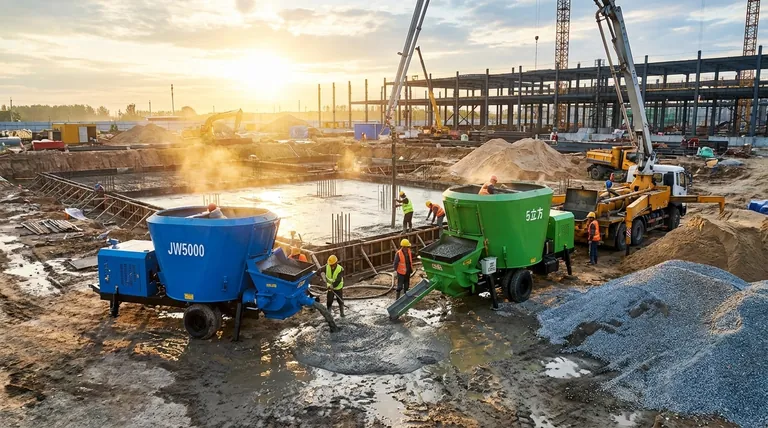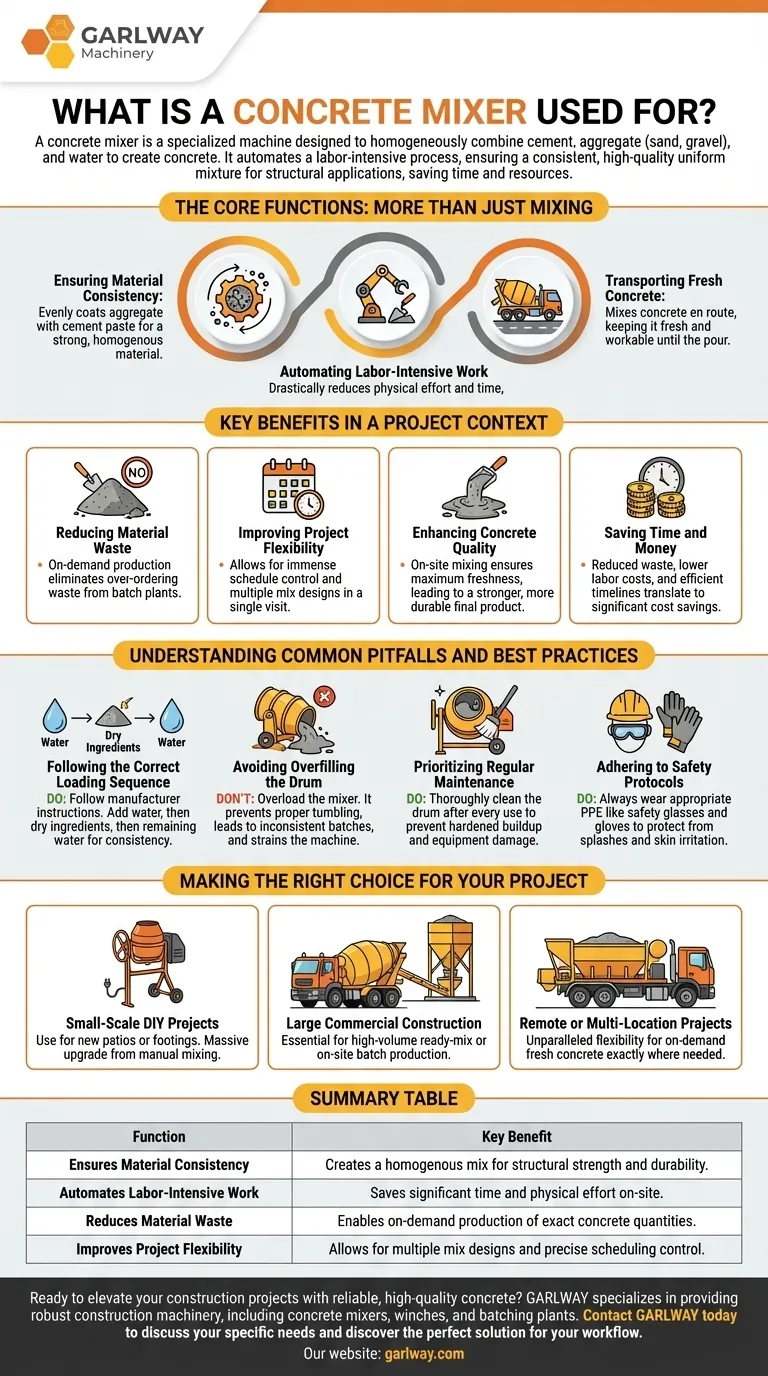A concrete mixer is a specialized machine designed for one primary purpose: to homogeneously combine cement, aggregate (such as sand or gravel), and water to create concrete. It automates what would otherwise be an incredibly labor-intensive process, ensuring the final mixture has the uniform consistency required for structural applications like foundations, slabs, and support columns.
The true purpose of a concrete mixer is not just to stir ingredients, but to guarantee a consistent, high-quality, and predictable end product. It transforms the core components of construction into a reliable building material, saving significant time, labor, and resources in the process.

The Core Functions: More Than Just Mixing
A mixer's role extends beyond simple blending. It is a critical tool for quality control and operational efficiency on any construction site.
Ensuring Material Consistency
A proper mix is essential for the strength and durability of concrete. A mixer ensures that cement paste evenly coats every piece of aggregate, eliminating weak spots and creating a homogenous, reliable material.
Automating Labor-Intensive Work
Manually mixing concrete is physically demanding and slow. A mixer drastically reduces the physical effort and time required, freeing up labor for other critical tasks on the project.
Transporting Fresh Concrete
Many mixers, especially those mounted on trucks, serve a dual purpose. They mix the concrete en route to or at the job site, ensuring it remains fresh and workable right up to the point of the pour.
Key Benefits in a Project Context
Utilizing a concrete mixer brings a host of advantages that directly impact a project's budget, timeline, and final quality.
Reducing Material Waste
Mobile and on-site mixers allow for the production of the exact amount of concrete needed, when it's needed. This on-demand capability virtually eliminates the costly waste associated with over-ordering from a batch plant.
Improving Project Flexibility
On-site mixing provides immense schedule control. It also allows for the creation of multiple, different concrete mix designs in a single visit, catering to various project requirements without delay.
Enhancing Concrete Quality
Concrete begins to cure the moment water is added. Mixing on-site ensures the concrete is as fresh as possible when poured. This results in a stronger, more durable final product with less risk of premature stiffening.
Saving Time and Money
The combination of reduced waste, lower labor requirements, and precise scheduling control translates directly into significant cost savings and more efficient project timelines.
Understanding Common Pitfalls and Best Practices
While highly effective, a mixer's performance depends on correct operation and maintenance. Ignoring best practices can lead to poor results and safety hazards.
Following the Correct Loading Sequence
Always follow the manufacturer's instructions. Typically, a portion of the water is added first, followed by the dry ingredients (cement, sand, and gravel), with the remaining water added last to achieve the right consistency.
Avoiding Overfilling the Drum
Overloading a mixer prevents the materials from tumbling and mixing properly. This results in an inconsistent batch and increases the risk of spills and mechanical strain on the machine.
Prioritizing Regular Maintenance
Concrete hardens quickly. The mixer drum must be cleaned thoroughly after every use to prevent hardened buildup, which can reduce mixing efficiency and damage the equipment over time.
Adhering to Safety Protocols
Operating a mixer requires appropriate personal protective equipment (PPE). Always wear safety glasses to protect from splashes and gloves to prevent skin irritation from wet cement.
Making the Right Choice for Your Project
The decision to use a mixer, and which type, depends entirely on the scale and logistics of your work.
- If your primary focus is a small-scale DIY project: A portable electric or gas mixer offers a massive upgrade over manual mixing, ensuring a consistent and stronger result for a new patio or footing.
- If your primary focus is a large commercial construction site: Truck-mounted mixers delivering ready-mix concrete or large on-site stationary batch mixers are essential for producing high volumes efficiently.
- If your primary focus is on remote or multi-location projects: A mobile volumetric mixer provides unparalleled flexibility, allowing you to produce fresh concrete on-demand exactly where it is needed.
Ultimately, incorporating a concrete mixer into your workflow elevates the task from simple labor to a controlled and repeatable engineering process.
Summary Table:
| Function | Key Benefit |
|---|---|
| Ensures Material Consistency | Creates a homogenous mix for structural strength and durability. |
| Automates Labor-Intensive Work | Saves significant time and physical effort on-site. |
| Reduces Material Waste | Enables on-demand production of exact concrete quantities. |
| Improves Project Flexibility | Allows for multiple mix designs and precise scheduling control. |
Ready to elevate your construction projects with reliable, high-quality concrete?
GARLWAY specializes in providing robust construction machinery, including concrete mixers, winches, and batching plants, tailored for construction companies and contractors globally. Our equipment is engineered to deliver the consistency and efficiency your projects demand, saving you time and reducing costs.
Contact GARLWAY today to discuss your specific needs and discover the perfect solution for your workflow.
Visual Guide

Related Products
- Ready Mixer Machine for Construction Ready Mix Machinery
- Commercial Construction Mixer Machine for Soil Cement Mixing Concrete
- Auto Concrete Cement Mixer Machine New
- JDC350 Small Cement Concrete Mortar Mixer
- HZS90 Large Multiquip Concrete Mixers for Construction
People Also Ask
- Can a concrete mixer be used for mortar? Understanding the trade-offs for your project
- What is the function of a concrete mixer machine? Achieve Consistent, High-Quality Concrete for Your Projects
- What should be considered regarding the output of a concrete mixer? Match Capacity to Your Project Scale
- What was significant about Roscoe Lee's 1934 concrete mixer design? Pioneering Modular Construction Equipment
- Why is the manufacturer's strength and service important when choosing a concrete mixer? Ensure Long-Term Project Success



















